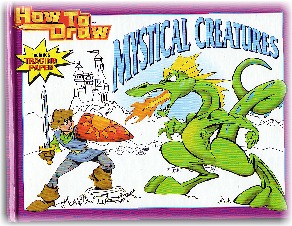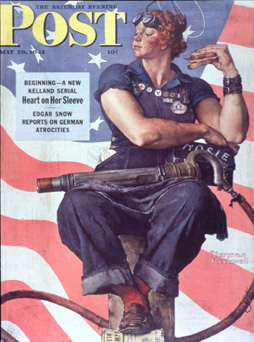|
(Synopsis: As G-Ma Lori observes and reflects on her three-year-old granddaughter's athletic prowess, she is reminded of the terror when she growing up in a time when 'Girls couldn't be Goatsuckers' or compete on an equal level with boys in school. G-Ma teaches Matt and Sarah a little history in sexual discrimination. The grandkids learn about the 'girls rule' found in Title IX that hasn't completely solved the problem of equality in sports programs in school and is now in jeopardy. G-Ma reminds the children Vigilance is the key to equality and tries to plant an understanding in her "little ones" so they understand that if the ruling is scrapped, Sarah's right to compete equally with boys might be endangered.) Girls Can Be Goatsuckers, Too! “Chupa – Chupa – Chupacabra.” My
five-year-old grandson, Matt yelled out the name of his latest favorite
monster – the Goatsucker--aka Chupacabra.
“G-Ma, I drew the Chu-pa-CA-bra, too,”
piped his three-year-old sister, Sarah. Sarah’s accurate enunciation was
not unexpected. Matt had patiently instructed her in the careful
pronunciation of most of his favorite dinosaurs so her syllables were
sharp and precise. She could recite their names even more clearly than he. Her remark rocketed me back in time—when girls
couldn’t be goatsuckers! Matt’s tugging at my arm brought me back to the
present. Sarah, unperturbed, flapped her arms and
pretended to ‘fly around’ Matt as she belted out her challenge, “…magic,
magic, magic unicorn, from the Land of ‘Chantment. Horn the monster!
Stop him….NOW.”
I was
proud of Sarah. I thought about my disappointments living in a
‘boy’s world’ when I was growing up, and always reminded Sarah how
lucky she was to live in today’s world. I tried not to dwell on the
unfairness of my past when girls couldn’t be “goatsuckers,” or to give her
any impression that girls are second-class children in today’s world.
At each opportunity, I told her that now girls are as equal as boys, are
given the same opportunities as boys. The big point I made was she
didn’t have to work harder, or be smarter, just to prove herself as an
equal—as in my childhood when the battle lines were clearly drawn and you
couldn’t step over them without major combat from the “man’s world.”
Matt’s question shifted the subject from monsterland to playground. “G-Ma, can we stop off at Tompkins Square Park on our way home?” He looked up at me and squeezed my hand. “I’ll do my homework right when we get home. Please say yes, G-Ma?” Matt’s blue eyes targeted mine. He entangled me into his wily web of imagination.
“I’m
a Saber-toothed Cat and I’m going to eat you, G-Ma…and Sarah, too.”
Dropping down onto the sidewalk with the softness of a jungle cat, he drew
up his upper lip to show his ‘fangs’ to us. Again, Sarah refused to be
intimidated. She charged him, knocking him flat down. Secretly, I was pleased Sarah was so strong and wasn’t a scaredy-girl. Girls historically, and in my own experience, have been gentled to be dependant and considered weaker than men. Throughout most of history, women generally have had fewer legal rights and career opportunities than men. Being a wife and mother were regarded as women’s most significant profession, a duty not to be challenged. It wasn’t until 1920 that women in America won the right to vote and, with it, increased educational and job opportunities.
As the historic date flashed through my mind, Sarah switched from
the self-sufficient toughie of the 21st Century to a domestic
caretaker. Just like kids—never know what they’re going to do next. “Uggggghhhhhh, G-Ma, I keep telling Sarah she does NOT have a baby in her tummy. Mommy does. She doesn’t. But, she won’t listen to me.” Matt condescendingly glanced at his sister. He looked up with his sweet big brother doting look, shook his blonde head and “ugggghhhhhed” again. Sarah believes she
is carrying a baby just
like her mother who is seven months pregnant. “Matt, Sarah, is just talking to her baby. It’s
okay to pretend.” Playing along with her, I offered her 21st Century options, most of which weren’t socially available when I was her age. “Well, little mommy Sarah, when it’s really time for your baby to come out, there are many different options or choices you can make with your life. You can work at a job, go to school, or choose to stay home and be a fulltime mother. What is especially fine is that you, as a girl, have more choices available to you than when G-Ma was a little one.” I wondered if this statement sounded like the old saw: “When I was your age, I had to walk three miles to school in a raging blizzard.” I laughed to myself, thinking back to my childhood. I actually did walk to school in blizzards! Only a few days earlier I read an article
reviewing the progress of women. It was Matt’s turn to pry into my past. “Mommy
said that you didn’t have sports at school, G-Ma. Only boys had stuff for
them. That’s not fair. She also said that when she was in school the boys
had more things to do than the girls. Usually Matt dramatically entertains Sarah and
me on our way home from his school. But today, I was doing most of the
talking, and they were listening even if the information was historic.
After all, both their parents are Phi Beta Kappa’s. I didn’t feel I was
over-talking their potential. We were fast approaching our street and my
mouth was dry. I ended my “lecture” for the moment as we launched our
daily run to the apartment door. “I’m playing with my dinosaurs and mommy Sarah can play with her dolls. No girls allowed!” Matt groaned and huffed into the apartment. “Matt, don’t say that,” I admonished. Matt nodded. “Yes, G-Ma, I remember
the story. You told me if I had a tree house, I have to let Sarah play
in it even if I didn’t want to because that’s the right thing to do. So,
Okay, I’ll let Sarah play in my tree house-- - if I get one.” Matt
indulgently smiled at Sarah who quickly took advantage of his change of
heart. She forgot her hungry baby and snatched up Matt’s T-rex toy like a
greedy kid in a candy shop. “Sister Bear Sarah and Brother Bear Matt,
“How does a ‘rule’ play, G-Ma?” Sarah teasingly danced around humming. She dangled the T-rex just beyond Matt’s reach, infuriating him. “Well, it’s kind of a long, but an important story kids. I’ll try to make it short for you to understand and then I’ll get you your after-school snack.” I knew food would lure their attention to an issue I was highly concerned about. I also hoped they would understand their rights of equality were in jeopardy. Nestling in on the couch, Matt on one side, Sarah on the other, I continued. “Everyone expected that Title Nine would ensure equality for boys and girls. But then Complacency reared its ugly head and Fears claws and teeth began to show.” “Wow, G-Ma, you are telling us a scary story now. G-Pa talks a lot about complacen-cee and I know what fear is. I guess they are monsters, too.” Both my monster-playing little ones snuggled in a bit closer. I gave them
a hug. “Yes. It is a scary story because when someone
tries to take away your rights it is scary, kids. Let
me explain what the problem is. The National Collegiate
Athletic Association and high school administrators complained
that boys sports suffered if girls’ sports were equally funded.” “G-Ma that’s twelve years later, right?” Matt triumphed out his correct mathematical calculation. I was glad he was listening.
I wasn’t sure the kids got my point until Matt’s questioned affirmed his understanding. “So, G-Ma, the boys get the same as the girls and girls get the same as boys. That's fair. So, what’s the problem, G-Ma? How is Sarah’s Title Nine in trouble?” he asked Sarah tugged at my arm, reminding me she was listening and that she knew her big brother was looking out for her. “No, more boys are playing than girls,” Matt
offered. I didn't want to give them more data than their little bear brains could handle and didn't broach the facts that there are many complaints that Title IX is now producing a decrease in collegiate-level and Olympic-specialty athletic programs for men. At the end of the 1998-99 academic year, only ten of the nation's more than 300 NCAA Division I colleges and universities have managed to get their federally required statistics in balance jeopardizing their sports programs for men. To boost varsity female totals some of the major colleges have begun conferring full 'team' status on exotic hobbies or outright trivia (bowling programs). As well as wrestling, other sports such as golf, swimming and diving, tennis and track and cross country programs have been suspended at some schools. “Now, I see what some of the problem is,
G-Ma. I want wrestling in the schools I will go to. I already practice
at yard time at my school.” Matt was beginning to understand some of the
problems with the not so perfect ruling. Sarah piped up. “I do sports, G-Ma. I am in
Gymnastics and skate and run and climb on the jungle gym. Mommy and
‘specially Auntie E did sports in school.” She paused and took a deep
breath to announce her godmother’s achievement. “Auntie E even went to
the Junior ‘Lympics. You’re the only girl who didn’t have sports, G-Ma”
Sarah hopped off the couch and marched around the room yelling ‘…girls,
girls, girls’. I’m a Power Puff Girl.” Matt’s eyes clouded up as he asked: “So how can the law be fixed, G-Ma, so Sarah and I can both do what we want?” “I think the coaches of the sport teams and all
the departments involved in the decision making of all the schools have to
be vigilant, kids. They must work together and take great care and actions
that sports programs and even the educational programs also are continued for both boys and girls and that the
money is spent in the best manner, even if it means that more is given to
the boys teams because there might be more boys wanting to play sports and
more sports only boys want to play.
The law needs to bend, like a straw, so everyone who wants to can play.
Right now, boys are suffering because not as many girls play sports as
boys. That’s not fair to the boys. Lots of people want to eliminate the
law. If they do, then girls would be terrorized by unfairness and
inequalities as G-Ma was. There would be no protection for the girls.” I gave both little bears a big hug. * * * * * * * * * * *
TITLE IX Title IX states: "No person in the U.S. shall, on the basis of sex be excluded from participation in, or denied the benefits of, or be subjected to discrimination under any educational program or activity receiving federal aid." Title IX governs the overall equity of treatment and opportunity in athletics while giving schools the flexibility to choose sports based on student body interest, geographic influence, a given school's budget restraints, and gender ratio. In other words, it is not a matter of women being able to participate in wrestling, or that exactly the same amount of money is spent per women's and men's basketball player. Instead, the focus is on the necessity for women to have equal opportunities as men on a whole, not on an individual basis. Athletic Financial Assistance: First, financial assistance must be awarded based on the number of male and female athletes. The test is financial proportionality. The total amount of athletics aid must be substantially proportionate to the ratio of male and female athletes. Accommodation of Athletic Interest & Abilities: Second , the selection of sports and the level of competition must effectively accommodate the students' interests and abilities there are 3 factors that are looks at consecutively. 1. Whether
the intercollegiate level participation opportunities for male and
female students are provided in number
substantially proportionate to their respective enrollments.
|








 Like most little
girls, she loved dressing up in her froo-froo wardrobe in contrast to her
rough and tumble play with her brother and her prowess in her gymnastics
class. She is a skilled enunciator with a varied vocabulary.
I’m convinced Sarah will become the perfect meld of the traditional and modern woman without going overboard and turning into a hardcore
feminist. She lives in the best of both worlds.
Like most little
girls, she loved dressing up in her froo-froo wardrobe in contrast to her
rough and tumble play with her brother and her prowess in her gymnastics
class. She is a skilled enunciator with a varied vocabulary.
I’m convinced Sarah will become the perfect meld of the traditional and modern woman without going overboard and turning into a hardcore
feminist. She lives in the best of both worlds. Sarah’s mind was still on her tummy, not the park. “G-Ma, mommies
can go to school, too. They don’t have to stay at home all of the
time. After my baby comes out, I’m going to school, too, like my mommy.”
She covered her belly with her arms and again whispered to her ‘baby’.
Fun at the park took a backseat to the ‘mommy’ issue.
Sarah’s mind was still on her tummy, not the park. “G-Ma, mommies
can go to school, too. They don’t have to stay at home all of the
time. After my baby comes out, I’m going to school, too, like my mommy.”
She covered her belly with her arms and again whispered to her ‘baby’.
Fun at the park took a backseat to the ‘mommy’ issue. During the 1960s several federal laws
improving the economic status of women were passed. The Equal Pay Act of
1963 required equal wages for men and women doing equal work. The Civil
Rights Act of 1964 prohibited discrimination against women by any company
with 25 or more employees.
During the 1960s several federal laws
improving the economic status of women were passed. The Equal Pay Act of
1963 required equal wages for men and women doing equal work. The Civil
Rights Act of 1964 prohibited discrimination against women by any company
with 25 or more employees.  Will Sarah have as many things to
do in school as I will? I hope she will. She would be so good at
sports.” Matt’s face scrunched, giving him that aura of a concerned old
man vigilantly concerned about his sister.
Will Sarah have as many things to
do in school as I will? I hope she will. She would be so good at
sports.” Matt’s face scrunched, giving him that aura of a concerned old
man vigilantly concerned about his sister.  they
called it the Education Amendment. It was passed in 1972 – a year after Auntie E was born. This law
prohibits discrimination. It means schools and school programs cannot be
against girls and women in federally…” I paused, remembering to whom I
was lecturing… “ that is government –funded education, including athletics
programs. Your mommy and Auntie E excelled in many sports both in school
and also in community sports programs. They had fun, learned many
athletic skills, made new friends and developed an appreciation for
teamwork. So it worked for them, but not for me.”
they
called it the Education Amendment. It was passed in 1972 – a year after Auntie E was born. This law
prohibits discrimination. It means schools and school programs cannot be
against girls and women in federally…” I paused, remembering to whom I
was lecturing… “ that is government –funded education, including athletics
programs. Your mommy and Auntie E excelled in many sports both in school
and also in community sports programs. They had fun, learned many
athletic skills, made new friends and developed an appreciation for
teamwork. So it worked for them, but not for me.”
 I
decided to clear the air with Matt. “Remember when I read to the two of you
the Berenstain Bears story ‘No Girls Allowed’ and how Sister and Brother
Bears worked out their differences and let each other to play in their
respective tree houses?”
I
decided to clear the air with Matt. “Remember when I read to the two of you
the Berenstain Bears story ‘No Girls Allowed’ and how Sister and Brother
Bears worked out their differences and let each other to play in their
respective tree houses?” please
remember teamwork and try to play together,” I offered. Then I threw
in my concern for the endangered species called Title IX, hoping to
implant it early in their minds. I straightened as I spoke. “If we
want to keep Title Nine alive, kids, we have to learn to play together
just like the lawmakers have to learn to play together to continue the law
that gives everyone equal rights in sports. If the people who make
laws don’t quit fighting the law will be dropped. G-Ma likes the
rule because it protects Sarah from being excluded from playing sports and
receiving the education boys and now girls have the
right to do. That includes you Matt.”
please
remember teamwork and try to play together,” I offered. Then I threw
in my concern for the endangered species called Title IX, hoping to
implant it early in their minds. I straightened as I spoke. “If we
want to keep Title Nine alive, kids, we have to learn to play together
just like the lawmakers have to learn to play together to continue the law
that gives everyone equal rights in sports. If the people who make
laws don’t quit fighting the law will be dropped. G-Ma likes the
rule because it protects Sarah from being excluded from playing sports and
receiving the education boys and now girls have the
right to do. That includes you Matt.”  I looked down at their faces, remembering I was talking to two
very attentive but young children. “Equally funded means
giving the same amount of money to both girls and boys programs.
Then, in 1984 the Supreme Court, the highest Court in our land,
almost extinguished, or ended, the law.”
I looked down at their faces, remembering I was talking to two
very attentive but young children. “Equally funded means
giving the same amount of money to both girls and boys programs.
Then, in 1984 the Supreme Court, the highest Court in our land,
almost extinguished, or ended, the law.” “Ah, my smart, Brother Bear, you are so right.”
I quickly continued so their attentive minds wouldn’t zoom elsewhere
before I planted my seeds of concern. Grandparents have the job of
helping their kids fight for what is right, I thought.
“Ah, my smart, Brother Bear, you are so right.”
I quickly continued so their attentive minds wouldn’t zoom elsewhere
before I planted my seeds of concern. Grandparents have the job of
helping their kids fight for what is right, I thought. “Let’s see. How can I explain this. G-Ma might
confuse you. So if I do, let me know, O.K., Matt?”
“Let’s see. How can I explain this. G-Ma might
confuse you. So if I do, let me know, O.K., Matt?” “Well, I told you that schools have to show the number male and
female athletes compared to the total number of male and female students
enrolled in the school. This is called a ratio or a percent. Like if
the school has 100 students and ten boys and ten girls play sports, both
boys and girls have ten percent playing. Would that be equal or not
equal Matt or Sarah?
“Well, I told you that schools have to show the number male and
female athletes compared to the total number of male and female students
enrolled in the school. This is called a ratio or a percent. Like if
the school has 100 students and ten boys and ten girls play sports, both
boys and girls have ten percent playing. Would that be equal or not
equal Matt or Sarah?


 It has to
be flexible and continue, or Sarah and other girls may end up like G-Ma!”
It has to
be flexible and continue, or Sarah and other girls may end up like G-Ma!”